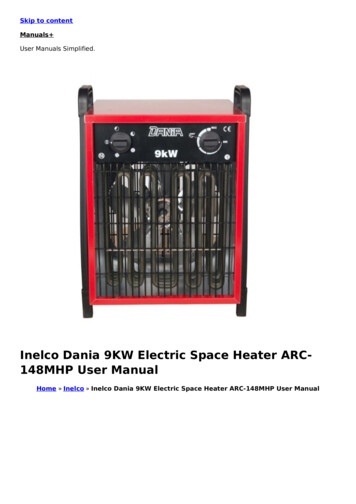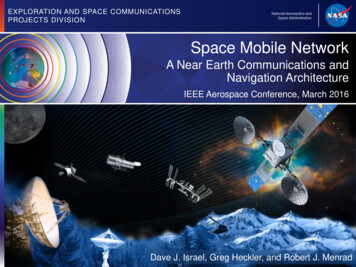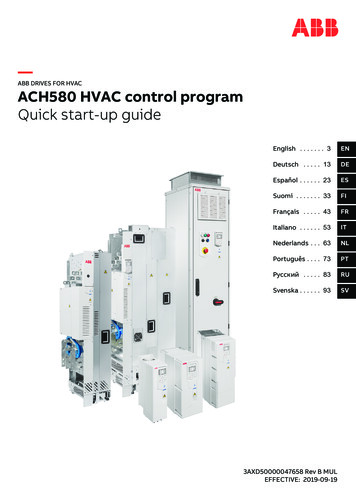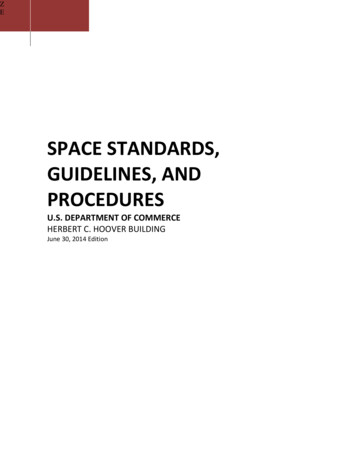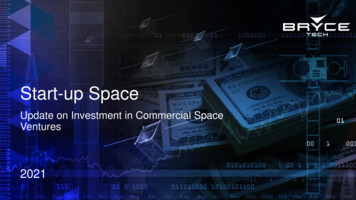
Transcription
Start-up SpaceUpdate on Investment in Commercial SpaceVentures20211
IntroductionThe Start-Up Space series examines space investment in the21st century and analyzes investment trends, focusing oncompanies that began as angel- and venture capital-backedstartupsThe Start-up Space report tracks publicly-reported seed,venture, and private equity investment in start-up spaceventures as they grow and mature, from 2000 – 2020. Reportincludes debt financing where applicable to provide a completepicture of the capital available, also highlights merger andacquisition (M&A) and initial public offering (IPO) activityStart-Up Space seeks to provide insight into the dynamics of thisgrowing space industry segment and the investment driving itStart-up Space seeks to inform investors, the aerospaceindustry, and the public about this emerging space ecosystem. Itreflects Bryce’s ongoing commitment to providing the spacecommunity with rigorous analyses of industry dynamics to aidgood decision-making in industry, government, and academia2
MethodologyDataset is sourced from a combination of BryceTech databasesCompany and investor press releasesAnnual reports, investor materials, and SEC filingsFinancial newsletters and databases, such as Crunchbase, PitchBook, Owler, and CB InsightsData provided by NewSpace HubNews articles from major media outlets, investment publications, trade press, and business journalsOngoing engagement with industry subject matter expertsWhere possible, we confirmed the details of each investment using multiple sources. We further validateour data with venture capitalists, private equity investors, investment bankers, industry experts,management teams at space companies, and through targeted interviewsThe data set includes only publicly reported transactions; it does not include proprietary investmentinformation. In some cases, transaction value, funding round, or investors are undisclosedThe data set generally excludes government funding, except for certain grants, such as those providedby the Grand Duchy of Luxembourg. Bryce also includes funding from publicly funded venture capitalfirms, such as the Central Intelligence Agency’s In-Q-Tel3
Definition of Start-Up Space VentureA space company is a business entity that provides space products or services, specifically one thatManufactures satellites, launch vehicles, or other space-based systemsManufactures satellite ground equipmentProvides services that rely on these systems, such as satellite TV, radio, broadband, remotesensing, or on-orbit servicing, assembly, and manufacturing servicesProvides analytic services based on data collected extensively from space-based systems,either alone or in combination with terrestrial systemsCriterion for a start-up venture is a space firm that has received and reported seed funding or venture capital4
Magnitude Invested in Start-up Space Companies 2020 7.6B124140Magnitude invested instart-up space companiesStart-up space companiesreceiving investmentDebt FinancingPublic Offering6% 2%AcquisitionVentureCapital13% 7.6BStart-up space deals15%Seed/Prize/Grant342Private Equity 0.1%Magnitude Invested inStart-up SpaceCompanies202064%Start-up space investors5
Magnitude Invested in Start-up Space Companies 2000 – 2020Magnitude Invested in Start-up Space Companies (millions) 8,000 7,000Public Offering 6,000Private EquityDebt Financing 5,000AcquisitionSeed/Prize/Grant 4,000Venture Capital 3,000 2,000 1,000 2000 2001 2002 2003 2004 2005 2006 2007 2008 2009 2010 2011 2012 2013 2014 2015 2016 2017 2018 2019 2020 36.7B invested in start-up space companies 2000 – 2020, 26.2B (72%) since 20156
Magnitude Invested in US and Non-US Start-up Space Companies2000 – 2020Magnitude Invested in Start-up Space Companies (millions) 8,000 7,000 6,000Non-US RecipientsUS Recipients 5,000 4,000 3,000 2,000 1,000 -2000 2001 2002 2003 2004 2005 2006 2007 2008 2009 2010 2011 2012 2013 2014 2015 2016 2017 2018 2019 2020US companies accounted for 67% of investment in 20207
Magnitude Invested in Start-up Space Companies (Excluding DebtFinancing and Acquisitions) 2000 – 2020Magnitude Invested in Start-up Space Companies (millions) 8,000 7,000Public Offering 6,000Private EquitySeed/Prize/Grant 5,000Venture Capital 4,000 3,000 2,000 1,000 2000 2001 2002 2003 2004 2005 2006 2007 2008 2009 2010 2011 2012 2013 2014 2015 2016 2017 2018 2019 2020Excluding debt financing acquisitions, 26B invested in start-up space companies 2000 – 2020, 22B (84%)8since 2015
Start-up Space Companies Founded Funded Since 2000Number of Start-up Space Companies Founded Funded60Nearly 400 angel- and venture- capital backed space companies have been founded and funded504030Excludes companies that have not announced investment, includingmany founded in the last few years. There is generally a multi-year lagfrom a company’s founding to when it receives external investment.Recently founded companies have not had a chance to raise (andannounce) external funding. The total number of reported start-upventures increases annually compared to each previous Bryce report,reflecting new announcements by existing companies, newcompanies, and enhanced data sets. This suggests that the number ofreported start-up space companies founded in 2020 (3) will increase inthe future. Data reflects publicly reported investments throughDecember 31, 2020# companiesidentified in 202120# companies identified inyear initially reported1002000200220042006200820102012Company Founding Year20142016201820209
US vs Non-US Start-up Space Recipients 2000 – 202090Number of Start-up Space Recipients80US RecipientsNon-US 82019202038% of companies receiving investment in 2020 were based in the US10
Number of Start-up Space Deals 2000 – 2020180160Number of Start-up Space 6200720082009201020112012201320142015140 start-up space deals in 2020 (169 deals in 2019)2016201720182019202011
Start-up Space Companies by Magnitude of 2020 Investment115 other start-upspace companies20%30%2%2%2%5% 7.6BMagnitude Invested inStart-up SpaceCompanies20206%14%7%13%9 companies accounted for 80% of start-up space investment in 2020, 3 companies accounted for nearly 60%12
Types of Space InvestorType of InvestorAngelInvestorsCharacterization ofInvestorHigh net worth individuals, families,or groups of angelsTypicalSpaceInvestmentInvestmentTypeExamples ofTransactionsExpectedReturns/ ExitHorizons 50K – 1MEquityYork Space Systems with 250K of angel investmentfrom Dylan Taylor in 2015 2M – 75MEquity preferredstock in severaltranches (e.g.,Series A, B, C)Kymeta with 333M of venturecapital from multiple (2012–present)5X investment/5yearsEquityVirgin Galactic with 490M ofinvestment from AabarInvestments (2009 and 2011)3-5X investment/3-5yearsSignificantly lessreturns than for PEfirms/horizon is overa long term5-10X investment/5-7yearsVentureCapital FirmsGroups of investors focusing onearly stage, high growth venturesand accepting a significant degree ofriskPrivate EquityFirmsLarge investment houses that havemulti-billion dollar investmentfunds—focus on establishedcompaniesCorporationsLarge companies providing strategicinvestments to support large CapExspace projects Internal R&D forspecial projects Independent R&Das government contractor Mergerand acquisition Venture investing 100M – 1BEquity andsometimes debtOneWeb with 4.4B ofinvestment from SoftBank,Airbus, Intelsat, and othercorporations (2015 – 2020)BanksPrivate and governmentbackedbanks providing substantial debtfinancing layered over equity 100M – 1BDebt, sometimesconvertible intoequityO3b with 184M of debtfinancing from COFACE in2015Straightline interestrates (e.g., 5–10%)PublicMarketsIndependent R&D as governmentcontractorEquityIridium raising 170M in anIPOServes as a vehicleto allow the earlier13investors to exit 100M – 1B 100M – 1B
Investors in Start-up Space Companies 2000 – 20201,212 investors invested in start-upspace companies 2000 – 2020BanksPrivate Equity Firms4%In 2020, 342 investors invested in 124start-up space companies across 140dealsNew investors continue to enter theecosystem. 211 investors invested instart-up space ventures for the firsttime in 2020 117 venture capital firms29 angel investors38 corporationsInvestors from the United Statesaccounted for 44% of all investors(36% in 2020)6%1,21218%CorporationsAngelInvestorsUnique Start-up SpaceInvestors2000 – 2020VentureCapital Firms52%20%14
Investors in Start-up Space Companies 2000 – 2020Number of Start-up Space Investors350300BanksPrivate Equity250CorporationsAngel Investors200Venture 15
US and Non-US Investors in Start-up Space Companies2000 – 2020400Number of Start-up Space Investors350Non-US Investors300US 20192020United States accounted for 44% of all start-up space investors 2000 – 2020 (36% in 2020)16
Start-up Space Investors by Country 2000 – 2020538 investors from the UnitedStates, 44% of all investors2000 – 2020 (124 in 2020,36% of total)Non-US Investors 2000 – 2020 China – 136 investorsJapan – 107 investorsUK – 103 investorsIndia – 37 investorsNon-US Investors 2020 China – 48 investorsUK – 31 investorsJapan – 21 investorsFrance – 17 Investors17
US Start-up Space Investors by State 2000 – 2020California is home to 45% of all US investors, New York accounts for 15%18
Most Active VCs in Start-up Space 2000 – 2020 (VC Firms investingin 3 Space Start-ups)10 48763548 venture capital firms have invested in three or more start-up space companies19
Common Investments Among Most Active VCs in Start-up Space2000 – 2020Fifty start-up space companies attracted investment from two or more of the most space-focused VCs (the 48VCs in previous slide)20
Venture Capital Firms with Most Start-up Space Deals 2000 – Deals11Deals12Deals13Deals14Deals21
Increase in SPAC Activity in Space IndustrySpecial-purpose acquisition companies (SPACs) are publicly traded companies established with the aimof raising funds to acquire or merge with a private company seeking to go publicSPACs enable firms to go public quicker than traditional IPOsSPACs increasingly popular across industries, raising 83B in capital in 2020 (space non-space), 6xprevious record (according to Bain & Company)While some space companies have gone public via SPAC in the past (Iridium 2008, Avio 2016), a surgehas been visible since Virgin Galactic merged with Social Capital Hedosophia in Oct 2019Most space companies going public via SPACs highlight the merger provides full funding for the comingyears; if necessary, companies can raise additional post-merger funds via secondary offerings ( 460Mby VG in Aug 2020)SPACs are included in this report in the year they begin trading publicly post merger22
Announced Space SPAC DealsTwelve announced space industry SPAC deals 5.1B 27.1BFunding being raisedthrough SPAC deals20192020Anticipated combined enterprise value(aggregate market values of companies)2021Q1Q2Q3Date Announced23
Start-up Space: What’s Next?LEO ConstellationsSmallsat LaunchVenturesDeployment of large LEO telecom constellations (SpaceX, OneWeb, Kuiper, Telesat, China Guo Wang), historic # of satsEarth observation satellite operators continue to deploy and expand constellationsBoth Earth observation and telecom smallsat ventures face significant hurdles in proving their business modelsLarge constellations drive interest in smallsat launch ventures (which face competition from large vehicle rideshare)Dozens of new small launch vehicles in varying phases of development and operation, many receiving significant investmentWhile governments are increasingly interested in small launch vehicles, competition with larger vehicles and business caseuncertainty will shape the commercial marketPrivate HumanSpaceflightGrowth in commercial suborbital human spaceflight anticipated after crews/passengers in 2021 on Virgin Galactic Blue OriginIncreasing activity related to commercial orbital human spaceflight; announced launches: Inspiration 4, Ax-1, Space AdventuresOn-orbit Servicing,Assembly, andManufacturingIncreasing interest in commercial on-orbit servicing, assembly, and manufacturing (OSAM) technologies markets, including lifeextension, debris removal, and in-space transportation, following successful MEV missions in 2019 and 2020OSAM activities have potential to expand sustainable on orbit ecosystem; face technology and business barriersExplorationNASA’s Artemis program, which seeks to return humans to the moon by 2024, includes opportunities for start-up companiesExploration start-up companies continued to raise capital, including SpaceX, Blue Origin, Astrobotic, and ispaceNational SecurityIncrease in government contracts targeting start-up space companies for initial/pilot programsUSG stakeholders increasingly viewed as important to venture-funded space start-upsSpace Development Agency awarding contracts, studies to start-ups to support National Defense Space ArchitectureNRO awarded study contracts to commercial Earth observation companies, poised to expand suppliers of commercial dataUSG small launch programs include contracts to Virgin Orbit and Rocket LabForeign governments increasingly aiming to leverage domestic start-up space capabilities24
AcknowledgementsThis report was written and produced by BryceTech, which conducted the study on which it is basedPoints of Contact Nick Boensch, Start-Up Space Project Lead, Nick.Boensch@brycetech.com Carissa Christensen, CEO, Carissa.Christensen@brycetech.com Rich Leshner, Vice President of Consulting, rich.leshner@brycetech.com Carie Mullins, Analytic Lead, Consulting Practice, carie.mullins@brycetech.com Simon Potter, Head of Investment and Financial Consulting, Simon.Potter@brycetech.comBryceTech thanks Blake Ahadi, Phil Smith, Manny Shar, Julia Bigwood, Elise Chenevey, David Lindgren,Ryan Puleo, and Justin Smith for their key contributions to this projectThe first report in the Start-Up Space series was released in 2016 and was supported in part by the NASAAmes Emerging Space Office, through a program later operated by the NASA Space Technology MissionDirectorate, the Emerging Space Program. We gratefully acknowledge Dr. Alexander MacDonald, Dr. DanielRasky, Lynn Harper, and Bruce PittmanWe also wish to thank the many investors and entrepreneurs who provided insight and shared theirexperience of space investment25
BryceTech1199 North Fairfax Street, Suite 800Alexandria, VA ce-tech703.647.8078Info@brycetech.com26
Dec 31, 2020 · 2 Introduction The Start-Up Space series examines space investment in the 21st century and analyzes investment trends, focusing on companies that began as angel- and venture capital-backed startups The Start-up Space report tracks publicly-reported seed, venture, and pri




